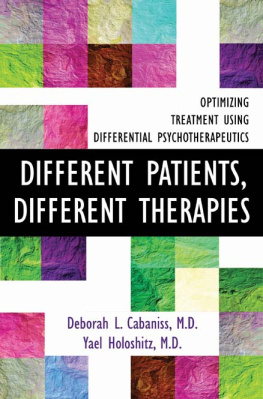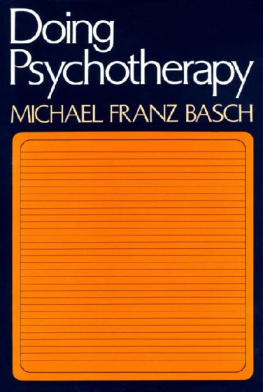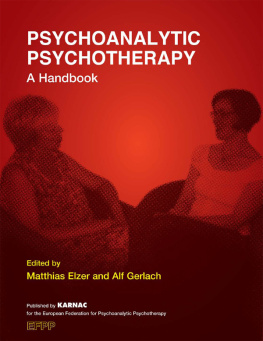
DIFFERENT PATIENTS,
DIFFERENT THERAPIES
OPTIMIZING TREATMENT
USING DIFFERENTIAL
PSYCHOTHERAPEUTICS
Deborah L. Cabaniss
Yael Holoshitz

W.W.NORTON & COMPANY
Independent Publishers Since 1923
A NORTON PROFESSIONAL BOOK
for Thomas
DLC
for my parents
Malli & Yossi
YH
Alan Barasch, MD , is Clinical Associate Professor of Psychiatry at Weill Cornell Medical Center, Lecturer in Psychiatry at Columbia University, and Research Faculty at Columbia University Center for Psychoanalytic Training and Research. He studied theater at Yale and has contributed to the use of role play in learning brief dynamic psychotherapy.
Adam Brenner, MD , Professor of Psychiatry, Director of Residency Training and Vice Chair of Education at University of Texas Southwestern Medical Center, is a psychodynamic psychiatrist. He graduated from the Boston Psychoanalytic Institute and serves on faculty at the Dallas Psychoanalytic Center. Dr. Brenner is Editor for the journal Academic Psychiatry.
Mary Kim Brewster, PhD , has written and presented nationally and internationally on the impact of serious mental illness and racial trauma on couple and family relationships. She received her PhD in Clinical Psychology from the City University of New York, an MBA from Columbia University, and has a private practice in Manhattan.
Beth S. Brodsky, PhD , Associate Clinical Professor of Psychology at Columbia University Department of Psychiatry, has conducted research on borderline personality disorder (BPD), develops clinical training programs on suicide prevention best practices, and is the author of a book and many articles on BPD, Dialectical Behavior Therapy, and suicide prevention. She teaches and supervises psychiatry residents and has a private practice in Manhattan.
Page Burkholder, MD , a Fellow of the Academy of Cognitive Therapy, specializes in and teaches CBT for psychosis (CBTp). She is also the Director of the Mental Health Outpatient Clinic at the Southern Arizona VA Health Care System in Tucson, Arizona.
Deborah L. Cabaniss, MD is Professor of Clinical Psychiatry and Associate Director of Residency Training in the Columbia University Department of Psychiatry. A psychoanalyst and psychodynamic psychotherapist, she teaches and writes about psychodynamic psychotherapy, psychoanalysis, and psychotherapy education.
Kenneth M. Carpenter, PhD , a Research Scientist at the New York State Psychiatric Institute and Director of Training at CMC: Foundation for Change, has been researching, teaching, and implementing evidence-based practices over the past 20 years to help and support individuals with substance use disorders and their families.
Erin Crocker, MD , is Clinical Associate Professor of Psychiatry and Associate Residency Training Director (Psychiatry) at the University of Iowa. She has an interest in the role of psychotherapy in all patient care interactions, particularly the use of supportive psychotherapy interventions for brief patient care encounters.
Alex Crumbley, PhD , is a clinical psychologist with specializations in attachment-related disorders, family systems, and the evaluation and treatment of psychosis. He is currently in private practice in New York City.
Michael Devlin, MD , is Professor of Clinical Psychiatry at Columbia University Vagelos College of Physicians and Surgeons. In addition to teaching and supervising psychiatry residents in CBT, he is active in medical student education, and he conducts clinical research in eating disorders, obesity, and bariatric surgery.
Carolyn J. Douglas, MD is Associate Clinical Professor of Psychiatry at the Columbia University College of Physicians and Surgeons and Adjunct Associate Professor of Psychiatry at Weill Cornell Medical College. She has been involved in psychiatric residency training throughout her career, has published several articles about teaching psychodynamic psychotherapy, and has won many teaching awards.
Deborah R. Glasofer, PhD , is Assistant Professor of Clinical Psychology in Psychiatry at Columbia University. She teaches and supervises CBT for adults with anxiety, mood, and eating disorders and is involved in eating disorders research. She has written on psychotherapy for Scientific American Mind, The Huffington Post, and Psychology Today.
Marina Gershkovich, PhD , Assistant Professor of Clinical Psychology in Psychiatry at Columbia University, is a clinical researcher and licensed clinical psychologist. She has extensive training and experience in cognitive behavioral treatments for anxiety, OCD, and related disorders, and she studies treatment outcome and dissemination of evidence-based therapies via telemental health approaches.
Robin Gibbs, PhD , is a clinical psychologist trained originally in psychodynamic psychotherapy and subsequently trained in EMDR and Sensorimotor Psychotherapy. Dr. Gibbs teaches, supervises and lectures on EMDR and trauma treatment and maintains a private practice in both White Plains, NY and New York City.
Ruth Graver, MD , Assistant Clinical Professor of Psychiatry at Columbia University, is a psychiatrist and training and supervising analyst at the Columbia University Center for Psychoanalytic Training and Research. The former co-chair of Curriculum at the Columbia Psychoanalytic Center, she teaches psychotherapy, psychoanalytic theory, technique, and writing to Columbia psychiatry residents and psychoanalytic candidates.
Richard Hersh, MD , a psychoanalyst on the faculty of the Columbia University Center for Psychoanalytic Training and Research, teaches TFP in the Columbia Psychiatry residency curriculum, and co-authored Fundamentals of Transference-Focused Psychotherapy: Applications in Psychiatric and Medical Settings published in 2017.
Danielle Kaplan, PhD , is a clinical psychologist in private practice and a Clinical Assistant Professor at the NYU School of Medicine. Her areas of expertise include cognitive-behavioral therapy, clinical supervision, and reproductive and perinatal mental health.
Joshua King, PsyD , is a clinical psychologist at the Center for Motivation and Change in New York City, who specializes in the treatment of substance use disorders using ACT, DBT, CBT and MI, and works with families utilizing the CRAFT approach.
Kristin Leight, MD , Assistant Professor of Clinical Psychiatry, is Director of Psychotherapy Training and Assistant Program Director for the University of Pennsylvania Psychiatry Residency Program. She completed psychiatry residency at Columbia and has an MD from Harvard Medical School and an MA in Classics and English literature from Oxford University.
Jon A. Levenson, MD , is Associate Clinical Professor of Psychiatry and Director of Undergraduate Medical Education in Consultation-Liaison Psychiatry at Columbia University Medical Center. He is an academic consultation-liaison psychiatrist whose scope of practice focuses in addressing psychiatric complications in patients with serious medical illness.
Anne Bodmer Lutz, BSN, MD , is the Director of the Institute for Solution-Focused Therapy. She is Assistant Professor of Psychiatry at the University of Massachusetts, consultant child psychiatrist at Doctor Franklin Perkins School and has a private practice in West Boylston Massachusetts. She is the author of Learning Solution-Focused Therapy: An Illustrated Guide.
Edward Nunes, MD , is Professor of Psychiatry at Columbia University Medical Center, and has spent his career conducting research on pharmacological and behavioral treatments for substance use disorders, co-occurring mood and substance use disorders, and the challenges of implementing these treatments in real-world, community-based treatment settings.
Next page









